This mindset will improve even the worst commute to work
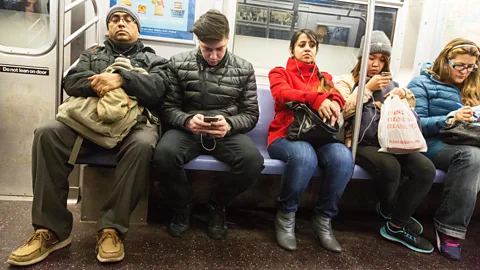 Alamy
AlamyHate your commute? You’re doing it wrong.
Jessica Patch had more than one reason for accepting a high-paying advertising job in San Francisco. There was the challenge of the work, of course, but she also knew the extra money would help fund expensive fertility treatments.
The trade-off: a 55-mile drive to the office that sometimes left her commuting by car up to four hours a day. Patch listened to podcasts to kill the time and took in a therapy show on Oprah Winfrey’s satellite radio station to ease the stress, but she said the strain of the lengthy commute, on top of a long workday “completely ruined my body.”
The 35-year-old developed stress-related stomach problems, got depressed and ended up with pinched nerves in her lower back from so much time sitting behind the wheel. And forget trying to conceive.
After nine months, she handed in her notice, quit the job and dedicated herself to freelance work in design and photography, which she could do from home (albeit at lower pay). She’s expecting her first child in October.
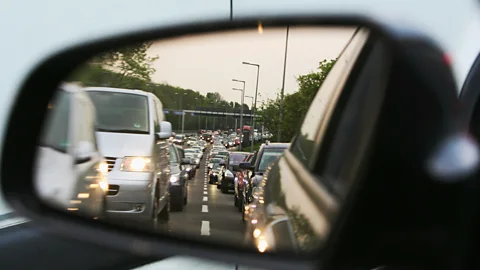 Getty Images
Getty ImagesPatch is hardly alone in experiencing the negative effects of a long commute.
“Commuting is stressful and stress has all sorts of side effects on health,” explained Iain Gately, author of the book Rush Hour: How 500 Million Commuters Survive the Daily Journey to Work. “I think many of us feel this overwhelming sense of powerlessness on commutes because we get stuck on a train or in a traffic jam and there is nothing we can do about it.”
But does commuting have to be so bad for our wellbeing?
Studies from Ghana to Germany show that the growing distance between where we work and where we live can lead to burnout, poor sleeping habits, social isolation and even emotional problems for our children. An analysis of the American Time Use Survey helps to quantify the negative effects even further for those in the US, noting “each minute spent commuting is associated with a 0.0257-minute exercise time reduction, a 0.0387-minute food preparation time reduction, and a 0.2205-minute sleep time reduction.” So, for instance, over the course of the year, someone who commutes for 15 hours each week for 50 weeks misses out on about half an hour of sleep each day.
Yet, newer research boldly argues that travelling to work could actually be a pretty important buffer separating home life from work life. Of course, there’s an underlying problem that keeps us from taking in the benefits of commuting. It’s us. Could it be that we aren’t utilising our commute time in the way we should?
Commuting with a plan
An international team of researchers surveyed 225 employees of a large media company in London earlier this year and found that the longer they commuted, the less happy and emotionally satisfied they were with their jobs. However, this negative relationship between commute time and job satisfaction didn’t exist for people who scored higher in one trait: self-control.
Jon Jachimowicz, a doctoral student at the Columbia Business School in New York and co-author of the paper Commuting With A Plan, explained that further studies on both sides of the Atlantic showed that “people with higher levels of trait self-control are more likely to engage in goal-oriented prospection on the way to work”.
That is, the simple act of mental forward planning during travel time makes a big difference. Essentially, people who have higher levels of self-control might ask themselves a series of questions on the morning commute, such as: What do I need to do today? How does that fit in with what I have to do this week? And will this play into my overall career goals?
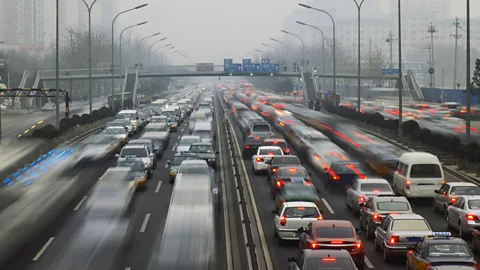 Alamy
AlamyBy doing this for a few minutes each day on the morning commute, the study showed that people are better equipped to transition both psychologically and temporally from their home role (as a father, mother or housemate) to their work role (as a boss, subordinate or colleague) and, consequently, report fewer feelings of stress or burnout.
And, while people who have more self-control do this naturally, Jachimowicz said, “it’s a strategy available to everyone.”
Mistakenly seeking solitude
While those of us who don’t drive to work may instead find time to read, answer emails or space out during our commute, it turns out, the solitary and unsociable way we behave on mass transit could actually be detrimental.
Why? People who travel on public transport typically have much longer travel times than those who drive. Statistics Canada, for example, found transit commutes in Canada to be 81% longer (41 extra minutes per day) than those by car. Plus, there’s the added stress of travelling with a group of people in crowded conditions.
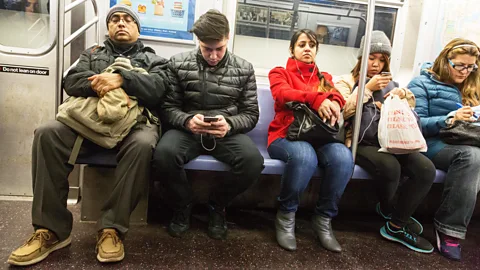 Alamy
AlamyIn most social circumstances we only allow people within an arm’s length of our body, but commuting on public transport violates nearly every rule of social engagement. Gately argued in his book Rush Hour that we very frequently travel in conditions that would be considered inhumane for livestock, particularly in cities like Tokyo, Beijing or Moscow, where transit systems are among the busiest in the world. Why then are most commuters okay with strangers invading their personal bubble?
“We don’t really treat people as people,” Gately explained. “We treat them as if they’re part of the furniture, and that enables us to get by without having to interact with them as we would in normal circumstances.”
That might help us to deal with overcrowding, but research shows it could be part of the reason our commutes feel so stressful. Nicholas Epley, a professor of behavioural science at the University of Chicago in the US, said there’s a social paradox that plays out on trains and buses around the world every morning when commuters mistakenly seek solitude.
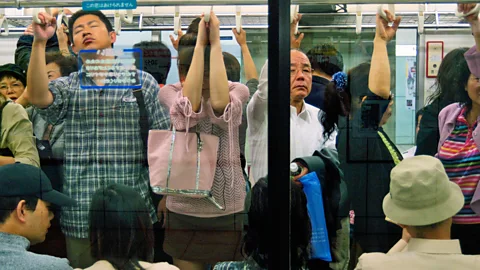 Alamy
Alamy“People tend to think others just aren’t that social and that if you started a conversation it would be unpleasant, but that’s what commuters are getting wrong,” Epley said. “What we learned from our experiments is that the biggest cost to commuting – the unhappiness that shows up in almost every survey you find – can go away just by talking to a stranger.”
Epley said humans are extremely social animals who crave connectivity, yet we vastly underestimate how interested strangers would be in talking to us. The average participant in the recent study, which took place on public transportation in Chicago, believed just 40% of commuters would engage in a conversation. The real figure: 100%.
Epley suggested leading with a compliment or observation as a potential icebreaker, and said his experiments suggest “both extroverts and introverts might be surprisingly happier if they were just a little bit more social than they are right now.”
